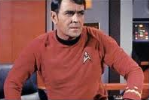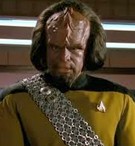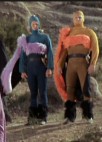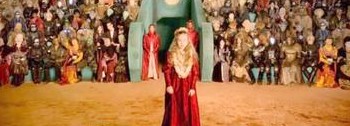The ten most annoying science fiction shows of all time

In a world where there's no unemployment, no inflation, and everyone in
the government knows what they're doing ... that's the world of science fiction.
A science fiction world is like a small universe: it starts with a bang, and if the
chemistry is right, it gets bigger and more sophisticated, with an ever richer variety of
characters and ideas. Some science fiction TV shows succeeded at this, and some ... didn't.
1. Star Trek
I sense economic decline here.
It's been said that the Star Trek universe is a socialist utopia: no money, big government runs everything, but there are no taxes because they've boosted the economy through the stratosphere with an economic theory called Warp Keynesianism, which uses tachyons to increase the velocity of money to trans-light speeds, or some such thing. In my opinion, though, people who criticize Star Trek: The Next Generation for being a socialist paradise are missing the point. It's actually intended to be a dystopia.
 Did he say, "General order 24 in 4 hours" or "General order
4 in 24 hours"? I cannae remember.
Did he say, "General order 24 in 4 hours" or "General order
4 in 24 hours"? I cannae remember.
First of all, there's no culture there--the closest thing they have to a living culture is an android who plays Mozart on the violin, which must sound as alien to them as ancient Japanese court music does to us. They're also intellectually stagnant. Almost no one, except the Klingons, ever has any original ideas that conflict significantly with the Federation ideology. As a result, they've become so anti-intellectualistic they can't even get excited when they discover a new species of sapient life or make a fantastic scientific breakthrough. So they spend most of their time in the holodeck trying to imagine what it must have been like to have to struggle to survive. Though they are all equal, and everyone has been given everything according to their needs, their lives are empty.
Sometimes you just have to have the courage to risk offending somebody to keep your self-respect. In a P.C. kind of world, having your own independent, unsanctioned ideas is a crime, because of the possibility that someone, somewhere might get offended by them. Star Trek shows us the consequences.
When was the last time anyone on STNG told a joke? They don't dare. They're too terrified of offending somebody. Starfleet doesn't need a Thought Police, because wit and independent thought no longer exist in the Federation.
What the writers in Star Trek are saying is, if you humans persist in being so politically correct, you could end up like this: a species so blasé about discovering new planets and so obsessed with being inoffensive that even being tossed halfway across the galaxy by a trans-dimensional being called a Q can't shake them out of their complacency. As a result, when they're attacked by the Borg (who not only have a culture, but a religion, and an ideology that is collectivist even by Federation standards), it's only dumb luck that saves the humans from getting wiped out.
Then we have the spin-offs, and the classic James T. Kirk original:
- Voyager -- The employees at Hewlett-Packard would recognize Captain Janeway, who seems to be modeled on Carly Fiorina (or is it the other way around?). The first day on the job, she accidentally puts the ship in reverse and gets it lost in the Delta Quadrant. Janeway has to rewrite the timeline so many times to escape from plot holes that people from the future, tired of snapping in and out of existence, start sending her notes telling her to quit messing with the future. Like H/P, Voyager finally managed to claw its way back to Earth by blowing up the very thing that helped them get there. Then they sold off all their assets and retired.
- Deep Space Nine -- The Ferengi seemed to start out as the writers' attempt to ridicule capitalists. It didn't work, and within a couple years the cartoonish Ferengi were exiled to DS9 and became part of the rubber-mask-wearing menagerie.
-
Original series -- The only show in history ever to have an actor who
acted like the character he played was intelligent. Spock made it tough for anyone
else ever to play a Vulcan, though Tuvok (Tim Russ) gave it a good college try.
And that famous interracial so-called kiss. You call that a kiss? The aliens had
to force them to do it. It was the only time Kirk kissed someone involuntarily.
Of course, that might have been just a ruse so he could use the "aliens from
outer space took over my body" defense when she sued him for sexual
harassment.
The original series was written before modern devices such as "computer passwords" and "door locks" were invented, thereby allowing any crewman or passenger on board the ship to take over life support, turn the engines on and off, send the ship hurtling out of the galaxy, or walk off with the ship's dilithium crystals.
Because of the insanely high death rate on previous Enterprises (13.7% of the crew on Kirk's ship alone, a death rate almost as high as the time somebody accidentally held a Star Trek convention next to a Star Wars Convention), they added a new crewman in Next Generation. She wears the special uniform of the Starfleet Grief Counselor Corps, and her job is to figure out what all the aliens are thinking. Half the time, she's probably thinking to herself, "I sense hostility here ... and there's something else ... oh, eewwwww!".
 Captain, I am picking up subspace distortions.
Captain, I am picking up subspace distortions.  The Enterprise discovered a planet where wearing a pink fluffy boa is the sign of a great warrior.
The Enterprise discovered a planet where wearing a pink fluffy boa is the sign of a great warrior.
Normal people, after having been killed, sent back in time, and resurrected a couple hundred times, would have been at least a little interested in how it was done. These intrepid explorers were just pissed that they had to re-set their clocks. Why are they even out there?
As the show develops, the Federation starts to show unmistakable signs of economic decline. Their society gets overrun with lawyers, who spend their days drafting new regulations. While Kirk flouted the Prime Directive with impunity, Jean-Luc Picard must feel as if the Starfleet Code requires a notarized affidavit and three copies of a signed purchase order before he's allowed to put the Enterprise into first gear. By the end, they became so rule-bound they had to ask permission from their boss, a bureaucratic lady admiral, every time they wanted to go above Warp Two*, for fear of chewing up space with their warp engines. When you reach that stage, the writing is on the wall. It's the beginning of an ignominious end for your civilization.
It's probably just as well, because in the craptastic Star Trek (2009), a crazy Romulan goes back in time, kills almost everybody, and destroys the Federation of Planets. It appears that director J.J. Abrams decided that the Star Trek universe had become too intelligent for the Oprah Generation, so he dumbed it down, quite literally, by killing off the Vulcans and replacing the Enterprise crew with MTV action figures. Unfortunately, that means that none of the events depicted in the previous 43 years of movies and TV shows ever happened. He has created an inescapable temporal paradox in the Star Trek world.
When your plot holes reach this magnitude, your imaginary universe becomes internally inconsistent, and there's not much you can do to save it. The fact that this movie won an Academy Award—the kiss of death for sci-fi—is proof that the Star Trek universe has finally imploded.
* Yes, I know in that episode they were only restricted to Warp 5, but in later ones their routine speed was limited to Warp 2 except in emergencies.
2. Battlestar Galactica
Frak frak frak frak frak.
I admit I missed the first few episodes of this one. That made it mighty confusing: in Battlestar Galactica: The Remake, characters get stabbed to death, shot, or blown into space, and then five minutes later they're back,
 Battlestar Galactica - Kindle version
Battlestar Galactica - Kindle version
Then there's the time they find a planet populated by thousands of copies of Grace Park, all of whom are stark naked. They seemed really friendly. So, what do the humans do? They blow it up! Not only that, but there are only about ten or twelve different types of these robots (or androids, or whatever) ... and the humans still can't recognize them. A species this stupid deserves to get wiped out.
In the real world, traveling at the speed they claim to be traveling at would be impossible in such a rickety space ship. At that speed, unless everything were working perfectly, the crew would be converted to a cloud of dust particles in about two seconds.
Or, in the immortal words of Starbuck: "Frak frak frak frak frackity frack fracking frak frak frak frak frak frak frak! Fracking frak frak frak frak frak frak frak fracking frak frak frakity frak frak frak frak fracking frak frak frak frak frak frak frak!" For these unimaginably stressed-out humans, that's practically frakkin' Shakespeare.
3. Doctor Who
The Smartest Guy in the Universe
My theory about Doctor Who, the incredibly long-running British sci-fi show, is that it's actually some kind of experiment by the BBC to estimate the size of the deepest plot hole it's possible to create, so they can determine how many new laws of physics they need to invent to extricate themselves, and The Doctor, from it. (Not necessarily The Doctor's companions; after all, there's no need for redshirts on this show. If your initials aren't "T.D.", you're either going to die, get sucked into a parallel dimension, get erased from history, have your memory erased, or some combination of the above.) The writers have also killed off all the Time Lords, the Daleks, the Master, Davros, The Doctor's wife, and just about everyone else who is not immortal.
This might be a sign that, after forty-eight years, the writers are getting really tired of writing sci-fi scripts for this damned thing and would kill for just one chance to write a nice musical. So they do.

The Doctor travels in a Tardis, a British-style "police box," i.e. phone booth. These are much bigger and more luxurious than our American phone booths, having a swimming pool, several squash courts, and a laundromat, and several sub-basement levels that bear a remarkable resemblance to the basement of BBC Studios. (In America, if we're lucky, our phone booth has a book in it.) The Doctor's phone booth has been programmed always to land in England, thereby protecting him (and younger viewers) from running into his former companions, most of whom have moved to Cardiff, Wales, where they formed Torchwood, an institute dedicated to experimentation in unusual sexual phenomena (see under "Eewwwww", above). The Doctor generally also avoids Scotland, where the Doctor once picked up a bad case of Bannockburn from Queen Victoria.
(Note to self: we should consider putting swimming pools in the phone booths in this country.)
You could say it's only natural for a story about "time" to be obsessed with death. But what's annoying is that many of the characters who are brutally murdered, incinerated, erased by a crack in time, or dissolved in acid are replaced by a clone or plastic robotic version who looks identical to the original and has the same memories. Sometimes they're replaced by the same artificial robot that murdered them. As far as The Doctor's concerned, that's just fine: if it has the same memories, it's the same person, innit? It's not its fault it happened to get there by being a mutant mass-murdering replicant. Even when his own wife gets killed, The Doctor creates a simulation of her inside a computer after she dies. Happy ending. It gets to live on. Bet she'd've been thrilled to hear that.
In one season, The Doctor accidentally destroys the entire universe, blows up his magic phone booth, and gets murdered. You might think that annihilating the universe would be as deep a plot hole as you can get. But getting killed and destroying all the matter, energy, and space-time that ever existed are just minor inconveniences for The Doctor. In fact, wiping out the universe is practically routine: in the last Tom Baker episode, for instance, the Master wipes out two-thirds of the universe by unleashing its stored-up entropy before The Doctor, who by this time is starting to look a little wooly and easily winded, finally manages to catch up to him (whereupon he gets killed, yet again, by falling off a radiotelescope antenna). About the only thing that's left alive this season is the Cybermats. I suspect they're probably next.
And who the heck names their kid "The", anyway?
4. Stargate SG-1
Where did those surface-to-air missiles go?
Speaking of plot holes, let's talk about Stargate SG-1. Here's a species that finds an ancient device that's a doorway to other planets, and their first day out they manage to piss off a superior race called the Goa'uld by nuking one of their planets. Somehow the humans manage not to get wiped out, and they defeat the Goa'uld. Then they're immediately overrun by Replicators, super-intelligent mechanical bugs, whom they easily dispatch by finding another ancient device. Next they're overrun by the Ori, evil super-intelligent ascended beings, whom they easily dispatch by finding another ancient device. Hmm, I'm beginning to see a pattern here.
In SG-1, we discover that most of the problems you run into from day to day can be solved by throwing an H-bomb at them. Those that can't can be solved with a sufficient quantity of weapons-grade naqahdah. (To be fair, sometimes they do realize that, in the long run, this can actually create as many problems as it solves.) Blowing up stars and irreplaceable stargates is S.O.P. for these guys, but future generations (if there are any) will probably be pissed to find there are only five or six stargates left, and half of those, thanks to the hu-mons, will suck your planet into a black hole the minute you open them. No wonder everyone wants to wipe the humans out.
Practically every other advanced civilization, including the Goa'uld, the Asgard, the Tok'ra, the Tollan, and the Ori, does get wiped out, or practically wiped out, on this show, mostly because of some unintended consequence of interference by the humans. Even the last of the Ancients gets thawed out, only to die of a bad cold caught from one of the humans. At this rate, Stargate SG-1: The Next Generation will have to be about the discovery of a magical invention called "a rock." The message, I guess, is: stay home.
5. The Six Million Dollar Man
Cheap fix
We have the technology.
We can make him better than he was before.
But we might have a little trouble getting him through airport security.
This show was produced before we realized that, for the government, six million bucks is just about enough to buy a screwdriver.
6. Lost in Space
Doctor Smith, how could you?
Timmy and Lassie in space. Planets floating around randomly, with no star in sight. Giant space algae that glom onto your flying saucer and frighten the children. A talking robot with five times more charisma and 100 times more brains than anybody else in the show. And a hot blonde chick. This show created all the stereotypes. Believe it or not, this show started out pretty good. But long before they added a pet monkey you knew it was going to suck. Oh, the pain.
7. Firefly
Ni tamade hundun
The only TV show this side of Chengdu where the people swear in Mandarin Chinese. If only they knew what they were really saying (hint: calling someone a "son of a chaotic ant" is not really an insult). Those darned tones in Chinese can be tricky. At least they didn't try to talk in Cantonese, which has seven of them.
What's really odd is that all the computerized warning messages, like "You're out of oxygen!" are in Cantonese. Sei ding lo! (you're going to die!) sounds better in Chinese anyway.
8. Andromeda
Gonna make you ... a star
If time travel isn't confusing enough for you, try Andromeda, where not only does the background story inexplicably change from episode to episode, but none of the characters are ever who they appear to be. One is, quite literally, a star, cleverly disguised as a girl. Another is some kind of primordial super-being disguised as a Greek god. Almost nothing that happens in this show makes any sense. It's almost as bizarre as the real world.
9. War of the Worlds
Remember nothing.
This one features a bunch of Martians, or Mortaxians, or whatever, who have to wear gas masks to protect themselves from our deadly Earth bacteria. They've been hibernating in steel drums since their cover was blown by the premiere of War of the Worlds in 1953. Even Elaine Giftos, who played the first of a second race of aliens, which was even badder than the first race, couldn't save this show.
The second bunch of aliens, as I remember it, were super-intelligent androids who liked to eat the first bunch. Maybe I remembered that wrong. Now that I think about it, that doesn't make sense, does it?
Anyway, all the main characters get killed off in this show, too, including the poor paralyzed guy. This was a show that self-destructed when the conspiracy theories became so convoluted that the conspirators began to imagine that the conspiracy theories were themselves conspiracies.
The message is that space is not necessarily a kind place: it could be crawling with aliens, all of whom hate each other as much as they hate us. The best part of the show was when Elaine Giftos walked around whacking everyone on the forehead with her palm, saying "Remember nothing!". It seems to have worked: this is a show that has been almost completely forgotten.
10. First Wave
Here we have a guy who discovers that Nostradamus predicted the Earth would be invaded by a species called the Gua, who look just like humans except for being made of green goo (known as "camole"). Unfortunately, the Gua have a fatal flaw: they get high on salt, so these Gua are often found at the beach grooving with the ionized particles. So much for their plans to conquer the Universe. Sucks to be a biological organism.
Runners-Up
11. The Prisoner
Where the heck am I?
Speaking of psychotropic drugs ... in The Prisoner, Patrick McGoohan is a high-strung spy who is kidnapped and held at a luxury seaside resort. Despite his stupendous intellect, zek McGoohan can't figure out where he is. Let's see: Everyone speaking with a British accent and wearing black top hats? Holly and 50-year-old English elm trees everywhere? White chalk cliffs? Cars driving on the left? Sun never high in the sky? So where is this awful place? Zambia? Uzbekistan? Or maybe Lithuania? No idea!
This show has been called the most intelligent show ever broadcast on TV. That might sound like damning with faint praise, but it's true. What Twilight Zone was to existentialism, Prisoner was to what we today call libertarianism.
The premise of the show is that some government created an exact replica of a small town, somewhere, and populated it with people who know "too much." England can be categorically ruled out, because in one episode you could see a small patch of blue sky. Undoubtedly it's located in some weird Iron Curtain country with a lot of fiendishly hard-to-spell place names like Penrhyndeudraeth or Llyn Trawsfynydd.
In his defense, he's probably just disoriented because they keep torturing him by spinning his chair around, blinking the lights in his bedroom on and off, and hurling weather balloons at him.
In this 60s dystopia, the government uses video cameras to keep the entire population under surveillance. How preposterous, we thought. The British, of all people, would never submit to that.
12. Cleopatra 2525
In the year 2525, if mankind is still alive, hot chicks will run around blasting things with ray guns. Nothing annoying about that at all ... unless you're one of those dreary purists who insists on things like "plots" and "stories that make sense." But, hey, let's keep our priorities straight.
13. Space:1999
Sitting on the biggest bomb ever made.
In this British sci-fi show, the Moon, having become bored with circling the Earth, launches itself into outer space. Along with a collection of props from 2001: A Space Odyssey (including an endless supply of shuttles), the inhabitants are amazed to find that not only is it never dark or cold in deep space, it is filled with many more or less friendly people, most of whom speak English with American accents. Looks like the Yanks got there first. Viewers who had hoped the Moon's inhabitants would have purple hair were disappointed.
14. Sliders
Look before you leap
An obnoxious kid invents a wormhole that opens into parallel worlds, and immediately jumps through it along with his girlfriend and his college professor. The kid and the professor are brutally murdered in the most gruesome and horrifying ways imaginable. The girl is (according to the other characters) raped, tortured, and kept alive as a disembodied brain until she finally commits suicide. The inhabitants of most of the parallel Earths are massacred and driven into slavery, except for those of one Earth, all six billion of whom are killed when the sliders accidentally blow it up.
Talk about depressing.
It's the oldest trick in show biz: get the audience to care about your characters, then torture them to death. Then do the same to your characters.